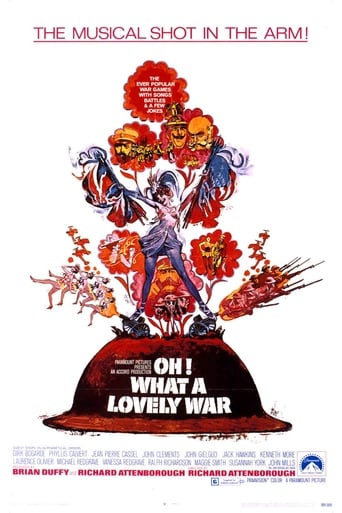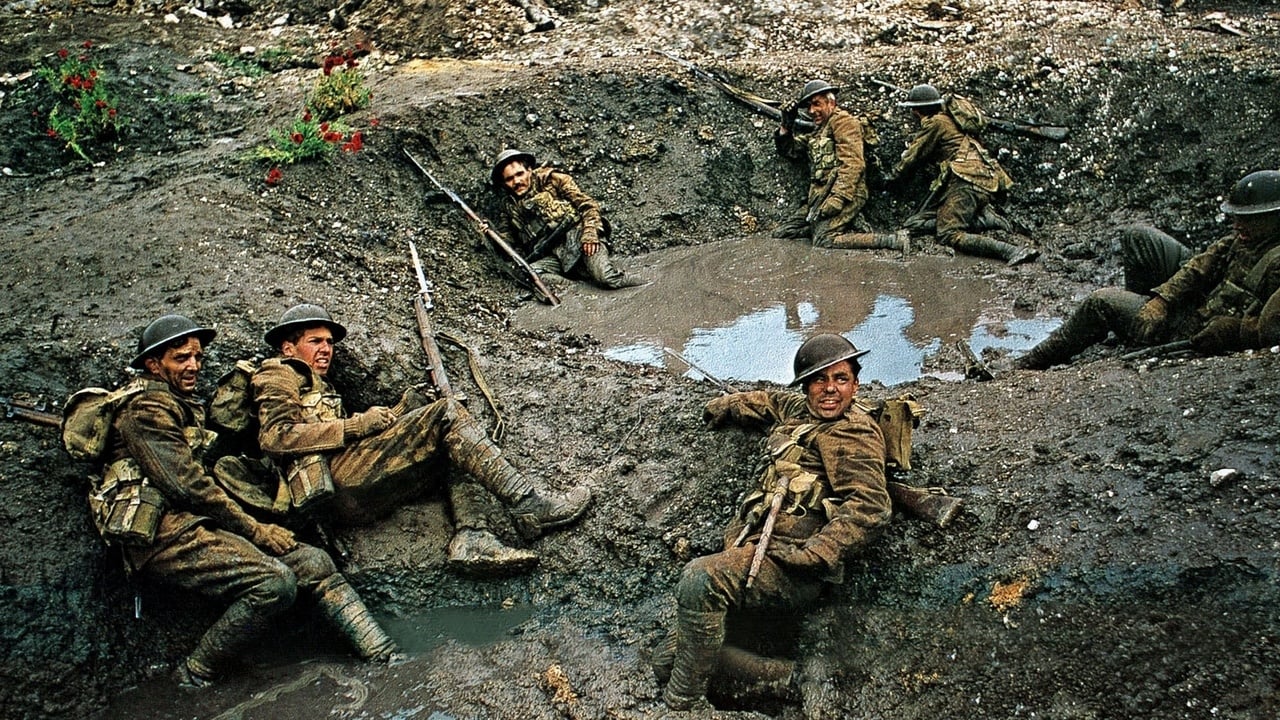mattimeo8
First of all, I should probably point out that I am almost certainly one of the youngest to review this film. My parents both saw the original stage production and are often waxing lyrical about it, so naturally when I discovered we also owned the DVD, my interest was piqued.And...what a film it is!Having been raised watching films dating back to the 50s, the 'dated' (if you can call it that) cinematography didn't concern me a bit. Instead, I was captivated all the way through, from the opening where the initial preparations of war are played out like an absurd live action game of Risk, to the final heart-wrenching shot of what seem to be endless rows of crosses. Despite the film's unusually long running time I found I wasn't once bored (and that's quite an achievement). I was astonished to find out this was Richard Attenborough's directorial debut - it seemed as well directed as any, and better than some, long-time directors.The film begins on pier where the start of the war is heralded by the public like some sort of carnival, before degenerating into the bleak, shell-shocked atmosphere we've come to associate with both World Wars. The film follows the Smith family as each male in the family signs up to take part in WWI, as well as glimpses into historical figures such as Sir Douglas Haig (played to perfection by Sir John Mills). The film is deeply satirical and unashamedly critical in its views of these officers who ordered thousands to their deaths as part of misguided attrition tactics. A memorable shot occurs during the title song, where Haig stumbles around blindfolded as part of a game of Blind Man's Bluff while a large cricket scoreboard looms over him displaying horrifying statistics of men lost vs ground gained. The film holds much of this juxtaposition between gut-wrenching realism and pathos, and events so ridiculous you almost can't help but laugh - a prime example being the arrival of the Americans into the war (cheerfully singing 'Over There') and the astounded expressions on the faces of Haig and co., and a second later you're back in the trenches with one of the Smiths preparing for a final offensive. The film is also deeply symbolic: there is no blood and all deaths occur of screen but all are foreshadowed by the appearance of a poppy near the doomed soldiers so that their fate is left in no doubt, all the while an eerily cheerful Joe Melia continues to pop up giving significant glances and smirks to the viewer as each Smith signs up - a figure easily comparable to Joel Grey's Emcee in 'Cabaret'.As someone who has been disillusioned with the idea of Remembrance Day since it seemingly became a promotional tool for any war our country currently invites itself into, this film certainly helped me remember what that day is really about. In my opinion, this film holds up against modern WWI films such as War Horse or Saving Private Ryan; however this film has the advantage of having (quite literally) an all-star cast who are all at the top of their game: names like John Mills, Maggie Smith, Ian Holm, Laurence Olivier, several Redgraves, Susannah York - all of whom are still known and recognised today.I don't care if this film was made before I was born; we need more films like this nowadays: less 3D CGI gimmick-y, more geared towards delivering a structured film with stellar acting from all involved. An absolute perfect 10.
TheLittleSongbird
Richard Attenborough is one of our greatest directors and actors, and I have really enjoyed his movies with him as director; Gandhi, Shadowlands, Chaplin and Cry Freedom to name a few. Oh! What a Lovely War is one of his more interesting films, and perhaps his most audacious. While sometimes lacking the power of the play by Joan Littlewood, and sometimes the structure is a tad disjointed, it is still a very entertaining and ultimately moving film. Visually it is great to look at, with great looking sets and colourful costumes. Attenborough cleverly stages the music hall numbers, which are all outstanding, and the spoken dialogue still retains the delicious satire of the play. The performances from an all star cast are exemplary, including Laurence Olivier, Michael Redgrave, Vanessa Redgrave, Joe Melia, Dirk Bogarde, Phillis Calvert and John Gielgud. All the performances were wonderful, but two in particular stood out. One was Maggie Smith as one of the showgirls in a small but wholly relevant role in the film. The other is John Mills as Haig, a brilliant and understated performance. All in all, a very interesting film. 8/10 Bethany Cox
CitizenCaine
Richard Attenborough's directorial debut is not an anti-war film as much as it's an anti-World War One film. The film attempts to tell the horrendous story of how World War One unfolded with biting satire and through staging a series of musical numbers with their origins in British history at the time. Sometimes the lyrics are changed to fit the intent of the filmmaker, which is to clearly point out the absurdity of the war. Attenborough combines cinematic ideas with the theatrical origins of the piece in a way that does not completely satisfy the viewer. Instead of a cohesive narrative, we get a series of music hall sketches strung together, some which have retained their theatrical roots and others which have been relegated to the outdoors. At well over two hours, it is easy to understand why the film is rarely screened on television. To cut even one or two musical numbers to fit a particular time slot would create a gaping hole in the film, more so than in others. The first song in the film,"Oh you beautiful doll", is a curious choice though, as it was written three years before the outbreak of the war. There are several isolated scenes in the film that are grand and poignant: the scene with Maggie Smith as a brash aide for recruitment of soldiers, the soldiers from both sides meeting on the battle field, and of course the terrific ending. However, in between are scenes which are tedious and do not always work, like the churchyard scene. There are several moments evocative of the times the film was made in, coincidental or not, which detract from the film. One gets the notion while watching that the intended impact of the film was probably better suited to the more intimate confines of the theater than the big screen. The film features a who's who of British cinema: Olivier, Mills, Gielgud, Richardson, Bogarde, etc. and look for Jane Seymour as one of the chorus girls backing Maggie Smith during her number. **1/2 of 4 stars.
alicespiral
Now on DVD with additional features including comments from all the major players. An all time favorite film because of the satire and today its nothing new same old thing. Each War seems to be worse than the last-lessons are never learned. Its the rich versus the poor-the officers who only got their commissions because they were born privileged. The film is obviously Anti War and wastes no opportunity to make pointed comments at the Masters of War. The cavalier attitude to Death is emphasised when one leader reads out the figures of "Casualties-201447 privates and officers killed yesterday.Ground gained-NIL" This movie says more about the futility of War than any other



 AD
AD




